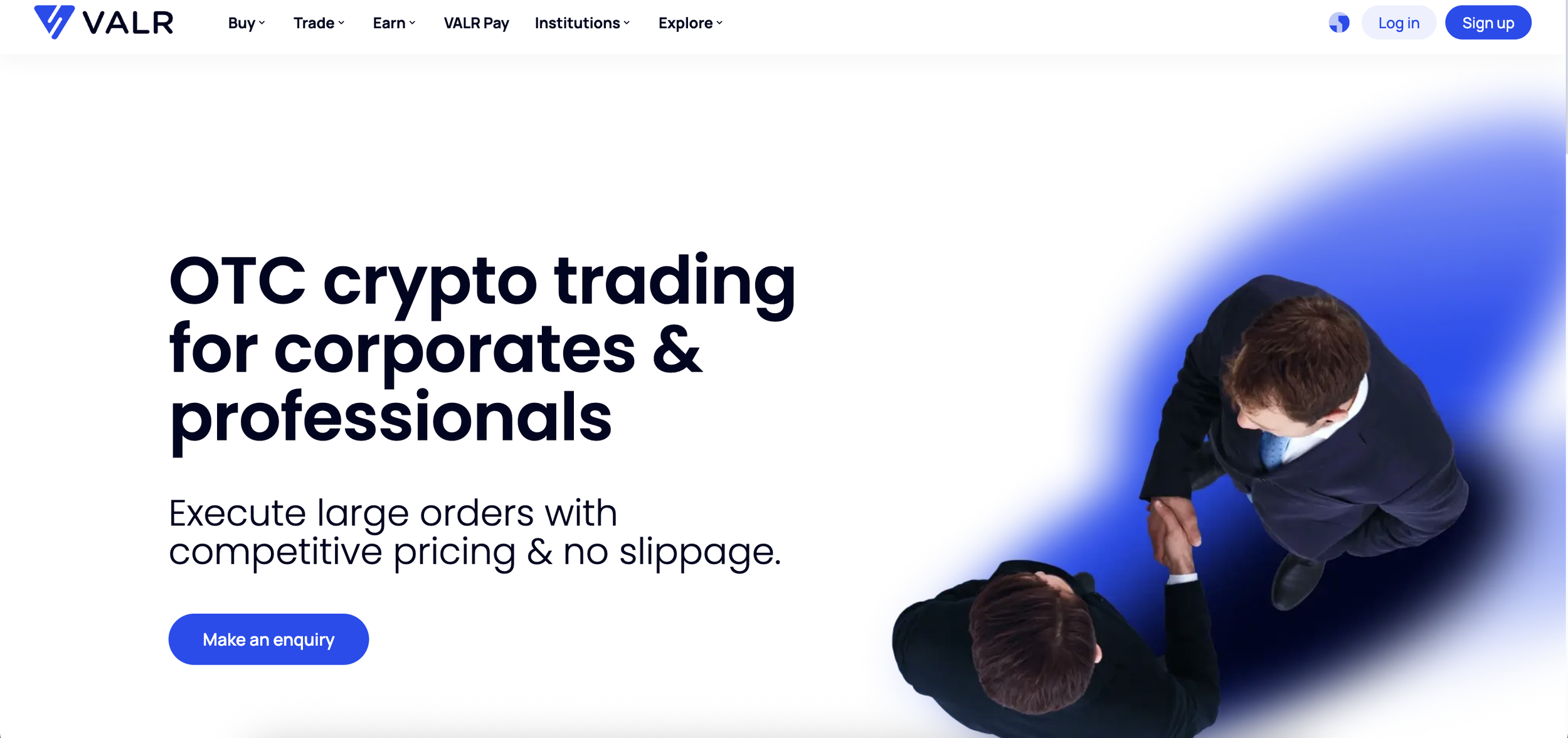Over-the-Counter (OTC) Crypto Trading Explained
When I think about buying cryptocurrencies, I picture the standard experience: logging into an exchange like VALR, checking charts, and executing trades at current market prices. This works fine for most people, but it's only half the story.
The problem is that this public exchange model breaks down spectacularly when you're dealing with large amounts. Try to buy $10 million worth of Bitcoin on an exchange and you'll move the market against yourself, pay increasingly worse prices, and broadcast your intentions to everyone watching. It's like trying to quietly buy out an entire grocery store—possible in theory, but messy in practice.
This is where over-the-counter crypto trading comes in. OTC deals happen away from public exchanges, letting big players trade significant amounts without the market impact and privacy issues that plague large public orders. Most retail crypto traders never see this parallel market, but it handles an enormous portion of actual crypto volume. I'm going to walk you through how OTC crypto trading works, who uses it, why it matters, and how you can access it.
What Is Over-the-Counter (OTC) Crypto Trading?
Over-the-counter (OTC) crypto trading refers to buying and selling cryptocurrencies directly between two parties or through a broker, completely bypassing public exchanges like traditional stock markets. Instead of placing orders that everyone can see on an exchange's order book, OTC trades happen privately at negotiated prices away from the public market.
In the cryptocurrency space, OTC trading operates on a similar principle. It allows individuals and institutions to buy or sell large quantities of crypto assets, like Bitcoin, Ethereum, and Solana, without those trades being displayed publicly on a centralised exchange's (CEX) order book until after they are completed (if at all). This direct dealing, often facilitated by specialised OTC desks - such as VALR's OTC crypto trading platform - offers a distinct alternative to the typical CEX experience.
The primary difference from exchange trading lies in how trades are initiated and executed. On a standard crypto exchange like VALR, you place an order (e.g., a market or limit order) that interacts with the existing public order book. The price is determined by the current supply and demand visible to all participants.
With OTC trading, the process is more tailored. Buyers and sellers, often through an OTC desk, negotiate the price and terms of the crypto trade privately. Once an agreement is reached, the trade is executed and settled directly between the parties, often with the OTC desk acting as a facilitator and ensuring secure settlement.
OTC is particularly suited for large "block trades" because executing such orders on a public exchange could significantly move the market price against the trader (slippage) and alert other market participants to their activity, which may not be desirable. OTC trading provides a more controlled and discreet environment for these substantial transactions.
What Are the Benefits of OTC Crypto Trading?
OTC crypto trading offers several compelling advantages, especially for those dealing with significant volumes:
Privacy and confidentiality: This is a cornerstone of OTC trading. Transactions are conducted privately, off the public order books. This discretion is crucial for high-net-worth individuals or institutions who don't want their large trades to be publicly visible, which could lead to market speculation, front-running by other traders, or unwanted attention on their trading strategies.
Reduced price slippage and market impact: When a large buy or sell order is placed on a traditional crypto exchange, it can consume available liquidity at various price levels, causing the average execution price to be worse than anticipated—this is slippage. OTC trades, by being negotiated directly, lock in a price for the entire volume, thus minimising or eliminating slippage and preventing the trade itself from causing adverse market volatility.
Better execution for large trades and access to deep liquidity: OTC desks typically have access to deeper liquidity pools than what might be visible on a single exchange's order book. They connect a network of buyers and sellers, including other institutions and liquidity providers, enabling them to fill large orders efficiently that might struggle to find sufficient counterparties on a public exchange. VALR's OTC desk, for example, specifically caters to executing large orders with competitive pricing and no slippage by tapping into these deeper liquidity sources.
Personalised service and customised terms: OTC trading often comes with a white-glove service. Clients can interact directly with traders at the OTC desk to discuss their needs, negotiate terms (like settlement timing—e.g., same day or T+1), and receive tailored advice. This contrasts with the often impersonal and standardised nature of standard digital asset exchange trading.
All-inclusive pricing: Many OTC desks, including VALR, provide a single "all-in" quote for orders (e.g., for trades over $50,000 on VALR). This means the price agreed upon is the price executed, with no separate transaction fees, offering clarity and predictability for large trades.
Who Trades Crypto OTC?
Given its benefits for large-volume transactions and privacy, OTC crypto trading is primarily utilised by a specific set of market participants:
High-net-worth individuals (HNWIs): Wealthy individuals looking to buy or sell substantial amounts of cryptocurrency often turn to OTC desks to manage their trades discreetly and efficiently, avoiding the market impact their orders might cause on public exchanges.
Institutional investors: Institutional investors, such as hedge funds, asset managers, family offices, and venture capital firms, frequently deal in large sizes and require the deep liquidity, price stability, and professional service that OTC desks provide.
Corporations: Companies looking to add Bitcoin or other digital assets to their treasury reserves or those needing to make large crypto payments or conversions often use OTC services for efficient execution.
Crypto miners: Miners who accumulate significant amounts of newly minted cryptocurrencies may use OTC desks to sell their holdings without disrupting market prices.
Crypto businesses and exchanges: Sometimes, crypto exchanges or other digital asset service providers might use OTC desks for their own treasury management or to source large blocks of liquidity.
In essence, anyone needing to transact large volumes of crypto with minimal market disruption and enhanced privacy is a prime candidate for OTC trading.
How to Trade Crypto OTC on VALR
Trading over-the-counter offers a streamlined way to execute large crypto trades with privacy and minimal market impact. VALR provides a dedicated OTC desk designed for corporates and professionals, ensuring competitive pricing and a personalised service for transactions starting from a minimum of $50,000. Key benefits include direct interaction with a trader, forward rates, secure settlement on VALR, multi-currency support, and all-inclusive pricing.
If you're looking to make substantial crypto trades without the complexities of navigating public order books, VALR's cryptocurrency OTC service could be an excellent solution. Here's how you can get started:
Head over to the official VALR OTC trading page and click the "Make an enquiry" button, which will take you to a contact form (or you can go directly here to submit your request).
Fill out the enquiry form with the necessary information and click the "Submit" button.
Once you've submitted the form, VALR's team will review your enquiry and get back to you to discuss your trading needs and guide you through the process.
Trading via VALR's OTC desk allows you to leverage deep liquidity, benefit from competitive pricing, and ensure your large trades are handled efficiently, privately, and without slippage.
Ready to explore VALR's full suite of crypto trading services?
Frequently Asked Questions
-
OTC (Over-the-Counter) in crypto trading refers to buying or selling cryptocurrencies directly between two parties or through an intermediary (an OTC desk or broker), rather than on a public exchange. These trades are private, not shown on public order books, and are often used for large-volume transactions.
-
To sell crypto OTC, you typically contact an OTC desk (like VALR’s), submit an enquiry, and negotiate the price and terms directly with a trader. Once terms are agreed, the trade is executed privately and securely, often with all-inclusive pricing and without public market impact.
-
Spot crypto trading occurs on exchanges with public order books, where prices are determined by open supply and demand. OTC crypto trading is private, off-exchange, and involves direct negotiation between parties (often facilitated by an OTC desk), making it more suitable for large trades with minimal market impact and greater confidentiality.
-
OTC contracts are traded through direct negotiation between buyers and sellers, usually with the help of an OTC desk or broker. The desk facilitates the transaction, matches buyers and sellers, negotiates terms, ensures secure settlement, and may offer personalised service and all-inclusive pricing.
-
OTC currency pairs refer to the specific cryptocurrencies (and possibly fiat currencies) available for OTC trading. For example, an OTC desk may offer pairs like BTC/USD, ETH/BTC, or SOL/USDT, allowing large trades between these assets outside the public exchange order book.
-
Bitcoin bought or sold on an exchange is traded publicly with visible order books, and prices are determined transparently by market supply and demand, often resulting in slippage for large trades. OTC Bitcoin trades are conducted privately in large volumes, with prices negotiated directly and settled off-exchange, offering more privacy, less slippage, and often personalized service.
Risk Disclosure
Trading or investing in crypto assets is risky and may result in the loss of capital as the value may fluctuate. VALR (Pty) Ltd is a licensed financial services provider (FSP #53308).
Disclaimer: Views expressed in this article are the personal views of the author and should not form the basis for making investment decisions, nor be construed as a recommendation or advice to engage in investment transactions.


